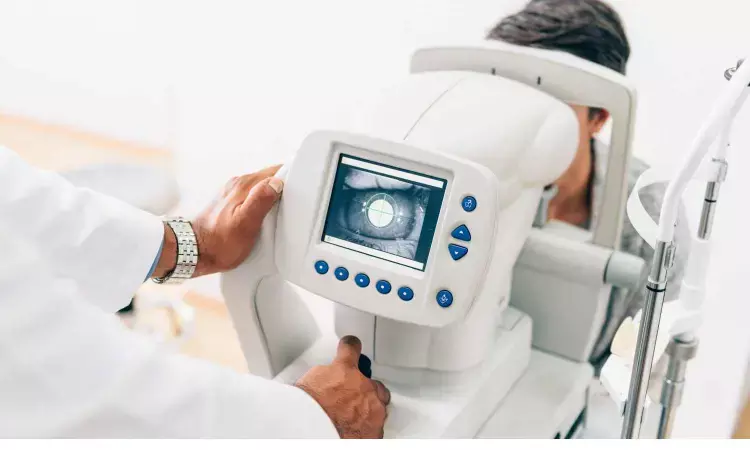- Home
- Medical news & Guidelines
- Anesthesiology
- Cardiology and CTVS
- Critical Care
- Dentistry
- Dermatology
- Diabetes and Endocrinology
- ENT
- Gastroenterology
- Medicine
- Nephrology
- Neurology
- Obstretics-Gynaecology
- Oncology
- Ophthalmology
- Orthopaedics
- Pediatrics-Neonatology
- Psychiatry
- Pulmonology
- Radiology
- Surgery
- Urology
- Laboratory Medicine
- Diet
- Nursing
- Paramedical
- Physiotherapy
- Health news
- Fact Check
- Bone Health Fact Check
- Brain Health Fact Check
- Cancer Related Fact Check
- Child Care Fact Check
- Dental and oral health fact check
- Diabetes and metabolic health fact check
- Diet and Nutrition Fact Check
- Eye and ENT Care Fact Check
- Fitness fact check
- Gut health fact check
- Heart health fact check
- Kidney health fact check
- Medical education fact check
- Men's health fact check
- Respiratory fact check
- Skin and hair care fact check
- Vaccine and Immunization fact check
- Women's health fact check
- AYUSH
- State News
- Andaman and Nicobar Islands
- Andhra Pradesh
- Arunachal Pradesh
- Assam
- Bihar
- Chandigarh
- Chattisgarh
- Dadra and Nagar Haveli
- Daman and Diu
- Delhi
- Goa
- Gujarat
- Haryana
- Himachal Pradesh
- Jammu & Kashmir
- Jharkhand
- Karnataka
- Kerala
- Ladakh
- Lakshadweep
- Madhya Pradesh
- Maharashtra
- Manipur
- Meghalaya
- Mizoram
- Nagaland
- Odisha
- Puducherry
- Punjab
- Rajasthan
- Sikkim
- Tamil Nadu
- Telangana
- Tripura
- Uttar Pradesh
- Uttrakhand
- West Bengal
- Medical Education
- Industry
Levosulpiride Shows Potential of Treating Diabetic Eye Conditions

A recent study published in the Eye Journal that the prokinetic drug levosulpiride may hold significant promise in the treatment of diabetic eye conditions, particularly center-involving Diabetic Macular Edema (DME). The study, a prospective, randomized, double-blinded, dual-center phase 2 trial, demonstrated that levosulpiride improved both visual and structural outcomes in patients with DME.
Diabetic retinopathy, a common complication of diabetes, can lead to severe vision impairment or blindness. One of its variants, proliferative diabetic retinopathy (PDR), is characterized by abnormal blood vessel growth and increased vascular permeability in the retina. Vasoinhibin, a molecule with anti-vasopermeability and anti-angiogenic properties, has shown promise in treating these conditions. This study aimed to explore the potential of levosulpiride in elevating vasoinhibin levels and its subsequent clinical benefits.
The study involved two groups: one with patients suffering from center-involving DME and another with PDR patients undergoing elective pars plana vitrectomy. In both groups, half of the participants received levosulpiride orally, while the other half received a placebo.
The results were striking. Patients treated with levosulpiride for eight weeks exhibited significant improvements in various key parameters compared to those on a placebo. Best-corrected visual acuity, central foveal thickness, and mean macular volume all showed statistically significant improvements at weeks 4, 6, and 8.
At the 8-week mark, patients in the levosulpiride group also experienced a higher proportion of positive outcomes. This included a greater number of patients gaining at least 5 ETDRS letters at 4 meters, losing more than 21 micrometers in central foveal thickness, and experiencing a reduction of more than 0.06 cubic millimeters in mean macular volume, all of which are crucial indicators of improved vision.
Additionally, the study found that levosulpiride reduced levels of vascular endothelial growth factor (VEGF) and placental growth factor (PlGF) in the vitreous of PDR patients, which are known to play key roles in the development and progression of diabetic eye diseases.
Importantly, no significant adverse side-effects were detected during the study, suggesting that oral levosulpiride is well-tolerated in these patient populations.
These findings indicate that levosulpiride may work by upregulating vasoinhibin and downregulating VEGF and PlGF within the eye, potentially offering an effective therapeutic option for patients with center-involving DME. However, further research through larger clinical trials is needed to assess the long-term efficacy and safety of this treatment. Nevertheless, this study marks a significant step forward in the fight against diabetic eye conditions and raises hope for improved vision and quality of life for millions of affected individuals worldwide.
Source:
Núñez-Amaro, C. D., López, M., Adán-Castro, E., Robles-Osorio, Ma. L., García-Franco, R., García-Roa, M., Villalpando-Gómez, Y., Ramírez-Neria, P., Pineiro, N., López-Star, E., Bertsch, T., Marínez de la Escalera, G., Triebel, J., & Clapp, C. (2023). Levosulpiride for the treatment of diabetic macular oedema: a phase 2 randomized clinical trial. In Eye. Springer Science and Business Media LLC. https://doi.org/10.1038/s41433-023-02715-5
Neuroscience Masters graduate
Jacinthlyn Sylvia, a Neuroscience Master's graduate from Chennai has worked extensively in deciphering the neurobiology of cognition and motor control in aging. She also has spread-out exposure to Neurosurgery from her Bachelor’s. She is currently involved in active Neuro-Oncology research. She is an upcoming neuroscientist with a fiery passion for writing. Her news cover at Medical Dialogues feature recent discoveries and updates from the healthcare and biomedical research fields. She can be reached at editorial@medicaldialogues.in
Dr Kamal Kant Kohli-MBBS, DTCD- a chest specialist with more than 30 years of practice and a flair for writing clinical articles, Dr Kamal Kant Kohli joined Medical Dialogues as a Chief Editor of Medical News. Besides writing articles, as an editor, he proofreads and verifies all the medical content published on Medical Dialogues including those coming from journals, studies,medical conferences,guidelines etc. Email: drkohli@medicaldialogues.in. Contact no. 011-43720751


